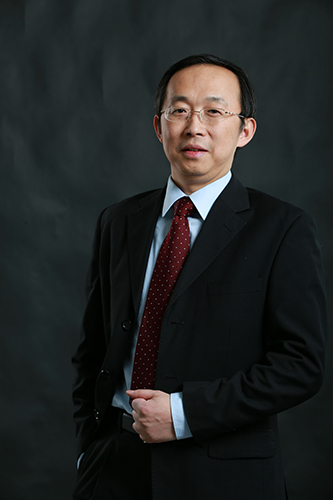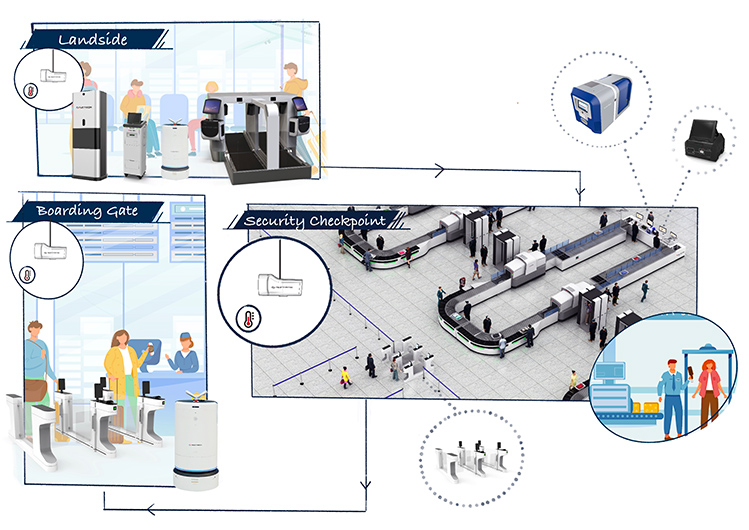An interview with Prof. Zhiqiang Chen from Tsinghua University, Chairman, President and Chief Executive Officer, NUCTECH. By Ross Falconer
In light of the ongoing global COVID-19 pandemic, many airports have been exploring innovative health screening measures to keep passengers safe from health threats and rebuild their confidence in air travel.
Temperature screening is one of the most widely adopted measures. “It can be fast, easy and contactless to identify passengers with a raised temperature – an important symptom of infection with COVID-19 – providing airports with a feasible way to fight against the pandemic,” explains Prof. Zhiqiang Chen from Tsinghua University, Chairman, President and Chief Executive Officer, NUCTECH.

Prof. Zhiqiang Chen from Tsinghua University, Chairman, President and Chief Executive Officer, NUCTECH: “It is time to reshape the future of air travel and lay the foundations for its future growth by piecing together hygiene measures, health screening technologies, self-service and automated solutions to better adapt to the post-COVID-19 era.”
As such, NUCTECH, a leading supplier of advanced security and safety solutions, has developed standalone and integrated solutions for elevated body temperature. “They both could conduct health screening at a safe distance in a non-invasive and automatic way, delivering a frictionless and healthy passenger journey with minimal disruption to airport operations,” says Prof. Chen.
Temperature screening technology as a layer of health screening measures should not lead to additional stress on passenger processes by potentially incurring extra wait time and crowd gathering. “NUCTECH’s FeverBlock screening system, a cutting-edge binocular thermal camera system, is designed for airports to perform mass screening of people,” explains Prof. Chen. “By combining infrared thermal imaging technology with visible light technology, it conducts skin temperature screening across multiple people automatically and rapidly at a safe distance of one to five metres, delivering a throughput of 200 people per minute.”
Artificial Intelligence (AI) is playing an important role in the evolution of the FeverBlock screening system to improve its detection accuracy and reduce false alarm rates. The embedded AI face detection algorithm can locate human faces quickly and accurately. “Also, it is capable of self-corrections of deviation caused by distance or forehead-body temperature difference,” says Prof. Chen. “Automatic compensation calculations would minimise false positives and negatives of this kind.”
In order to further streamline the screening process, NUCTECH has developed state-of-the-art thermal imaging modules to be integrated with existing security scanners and an innovative robotic platform. “For instance, combined with the terahertz wave body scanner, temperature checking can be completed simultaneously with security screening,” says Prof. Chen. “With a high throughput of 2,000 persons/hour, the solution allows for passengers to go through safety and security checking in a seamless, touchless and privacy-respecting manner.”
The thermal imaging module can also be mounted on NUCTECH’s iGuard robotic platform for flexible deployment. The integrated solution can automatically patrol a pre-defined place to serve as a temporary fever-screening post, quickly responding to fluctuations in flight schedules.
Improving hygiene standards through comprehensive disinfection
The EASA/ECDC Aviation Health Safety Protocol recommends that airports deploy separate physical booths for suspected COVID-19 cases requiring further assessment. Similarly, the booths should be disinfected after each use to prevent viral transmission to the next occupants.
“In this case, NUCTECH’s WeSpace physical isolation unit is coming in handy to provide airports with an ad-hoc isolation room for the suspected cases waiting for further medical assessment,” explains Prof. Chen. “WeSpace, equipped with UV disinfection technology, can be disinfected and sterilized fast and effectively after each use. Usually, thorough sterilization can be completed within half an hour to eliminate the presence of virus, preventing cross transmission to the next occupants and effectively containing the spread of contagious diseases.”
Equipped with a two-way communication system and a mobile tablet, the isolation room can be utilised for safe interviews and contactless medical observation. Coupled with tailor-made mobile application, it allows officials to perform epidemiological surveys for contact tracing, while protecting airport staff and passengers from risky exposure to virus.
Disinfection has become a crucial step to deliver a safe environment for both passengers and staff. A unique challenge is the high contact nature of the screening process, with frequent close interactions between passengers and interfaces of baggage trays. “A study from Finland’s National Institute for Health and Welfare uncovers that the tray used in the security checkpoint is the place containing the most germs and viruses at the airport,” says Prof. Chen.
NUCTECH has introduced a UV-C Tray Disinfection Module, specially designed for cleaning trays at security checkpoints and easily integrated with tray return systems. “The solution can deliver high doses of UV-C light and eliminate 99.99% of viruses and bacteria attached on trays automatically,” Prof. Chen comments.
Another innovation is the iGuard disinfection robot, a recently-developed mobile disinfection system by NUCTECH. Large quantities of disinfectant or a UVC module can be mounted onto iGuard to enable comprehensive cleaning around high footfall areas. It is equipped with a large 15-litre container for disinfection spray. “UV-C light can also be configured to cover a broad area by disinfecting the air around the autonomously moving robot,” says Prof. Chen. “As a tireless robot, iGuard is capable of long working hours with steady performance. It is easy to operate and can be automatically recharged after finishing routine cleaning. Capable of 24/7 services, it can operate automatically with only a few operators needed to supervise the fleet.”

More and more advanced technologies are being utilised to facilitate a touchless and efficient passenger experience, while reassuring passengers and airport staff of safety and security.
Automation and intelligence
More and more advanced technologies are being utilised to facilitate a touchless and efficient passenger experience, while reassuring passengers and airport staff of safety and security.
Approved by ECAC at EDSCB standard C3, the Kylin Ti X-ray CT inspection system enables liquids and laptops to be left inside passenger bags. “Fewer trays are needed and less contact among passengers, staff and the surface of trays,” Prof. Chen explains. “Moreover, the high throughput could help airports maintain a steady passenger flow and make it easier to avoid any congregation of people.”
Meanwhile, millimetre wave body scanners have been employed by many airports as a primary or secondary passenger screening technology. “As a better alternative to a traditional metal detector, it not only improves detection of non-metal items, but also enables a targeted secondary search by highlighting the position of concealment under clothing on a generic figure,” says Prof. Chen.
AI is also playing an increasingly vital role in transformation of the security process by empowering the whole system with more automation and intelligence. “AI-enabled algorithms have greatly improved the detection capabilities of millimetre wave body scanners and CT scanners with automatic recognition of targeted items, and also delivered very low false alarm rates, demonstrating the potential for reduction of high-contact re-checks,” Prof. Chen explains. “This can significantly speed-up passenger flow and reduce unnecessary interactions between passengers and staff, while improving security levels in an efficient and effective way.”
In light of the ongoing COVID-19 pandemic, health and security will remain top priorities for the aviation community. To facilitate travel and improve passenger experience remains at the heart of the restart of the aviation industry.
Prof. Chen emphasises the importance of airports and other stakeholders working together to apply innovative security and health measures to support airport operations. “Sooner or later, the airports and aviation industry will recover from the current crisis. It is time to reshape the future of air travel and lay the foundations for its future growth by piecing together hygiene measures, health screening technologies, self-service and automated solutions to better adapt to the post-COVID-19 era.”







